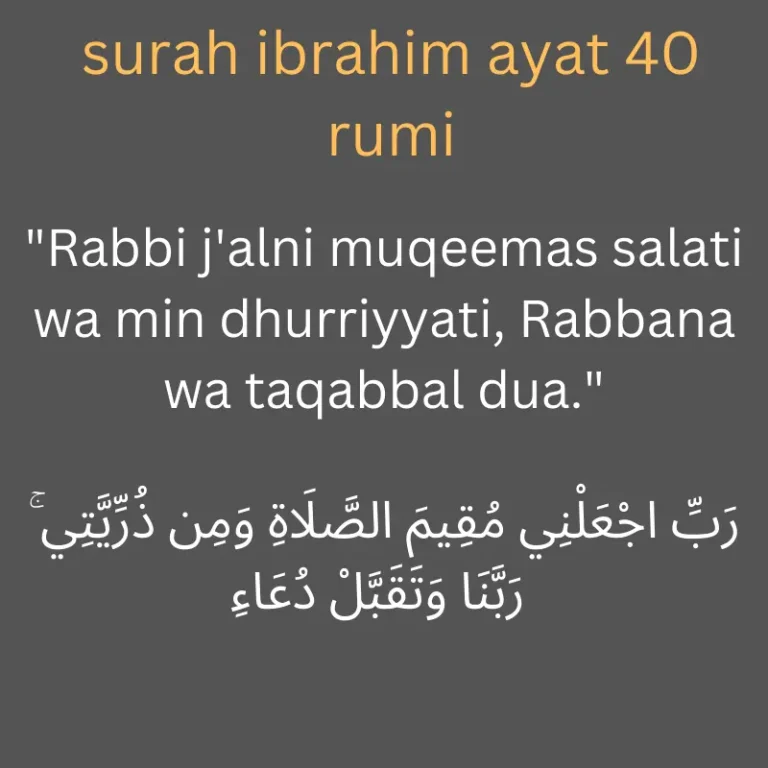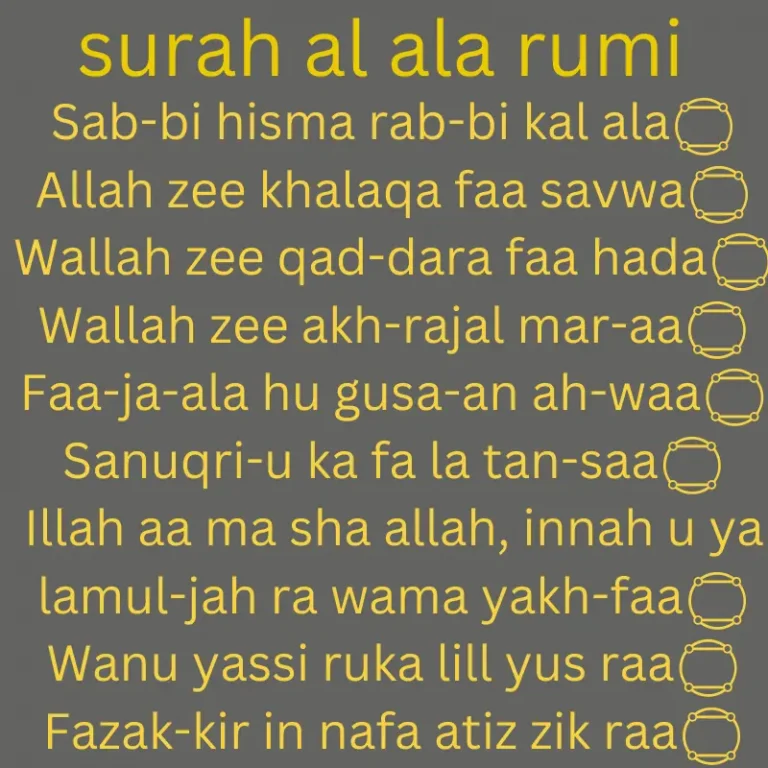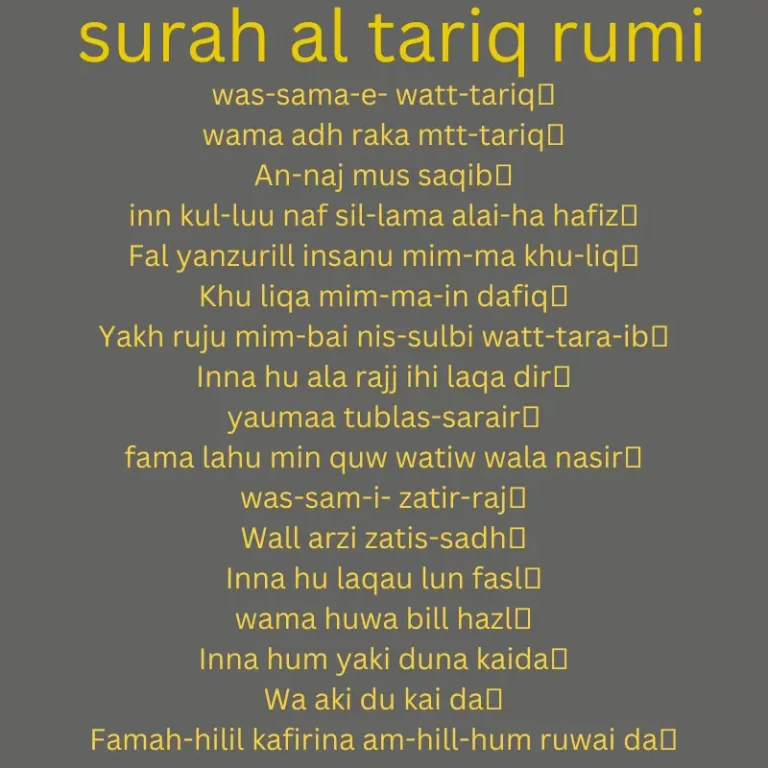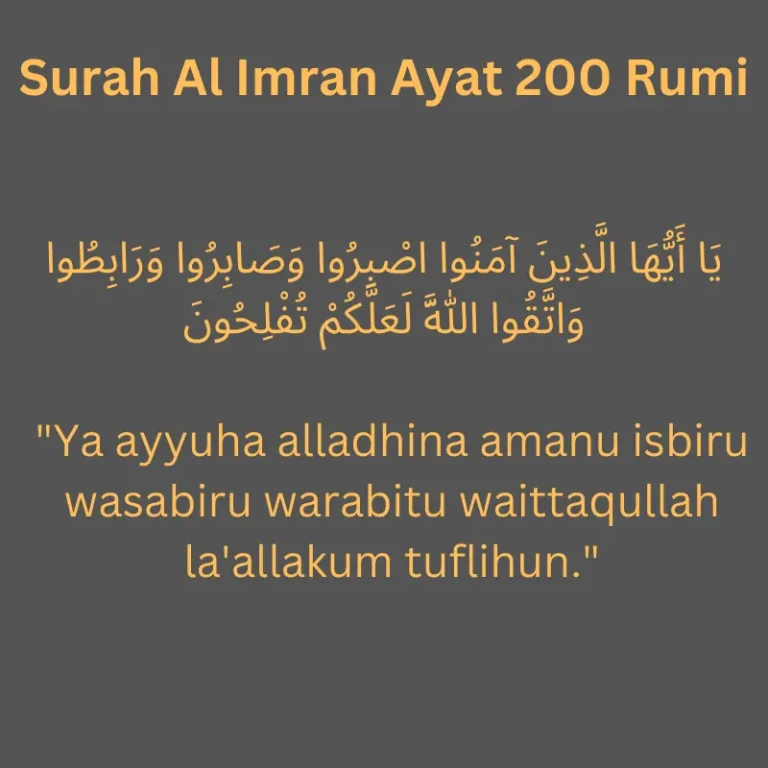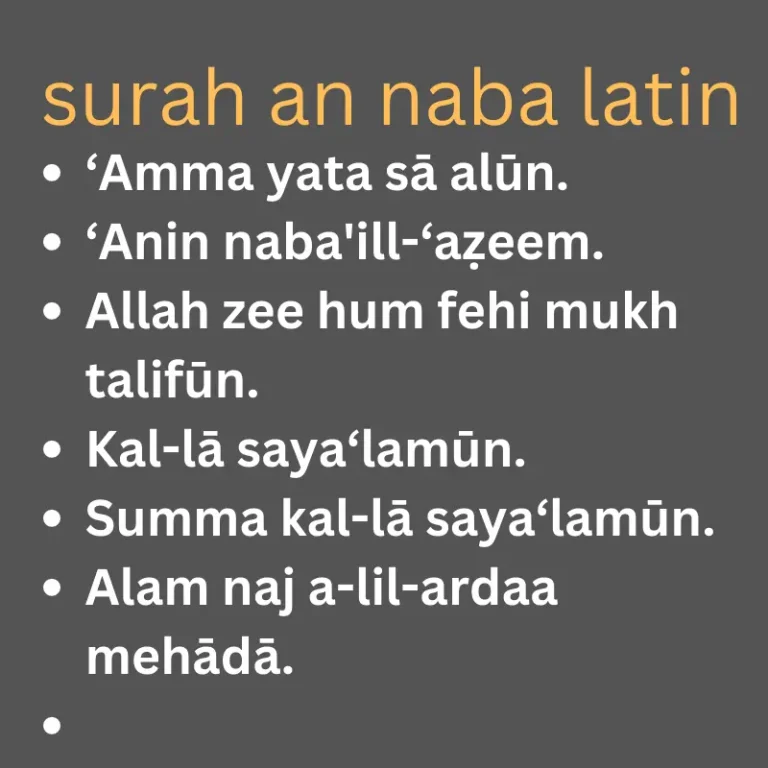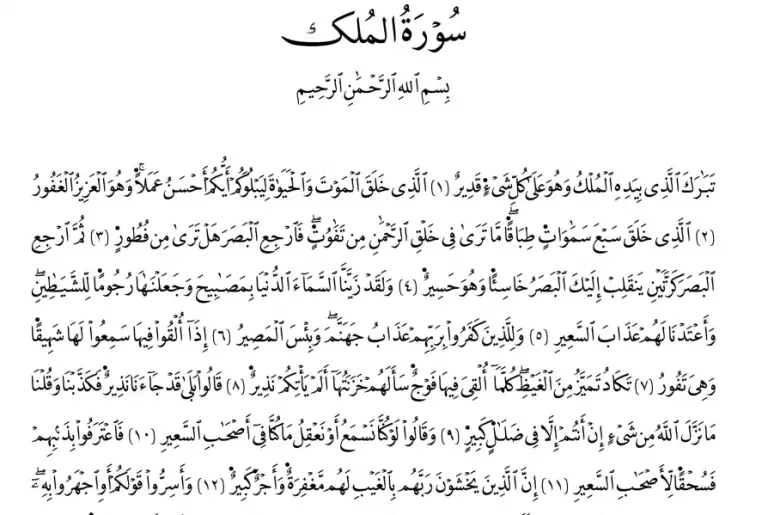Ayat Kursi Rumi
Bismillah hir-rehmaan nir-raheem
Allah hu laa illa ha illa hu wa All-Haiyull Qayoum
Laa tah khuzhu hu senatoun wala naowm
lahu ma fis-samawati wa ma fill-arz
Man zhalla zhi yash fahu indahu illah bi-izhnihi
Yah lamu ma baina aidihim wama khalfahum
wala yuhitouna bee shai immin ilmi hi illah bima sha a
Wasia kursiyu hus samawati wal arz
wala yaoudu hu hifzu huma Wa Huwal Ali yull Azheem
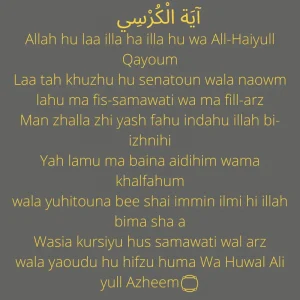
Maksud Ayat Kursi
Allah, tiada Tuhan selain Dia, Yang Hidup Kekal, Yang Memelihara segala yang ada. Tiada rasa mengantuk menimpa-Nya dan tidak pula tidur. Kepunyaan-Nya apa yang ada di langit dan apa yang ada di bumi. Siapakah yang dapat memberi syafaat di sisi-Nya melainkan dengan izin-Nya? Dia mengetahui apa yang sebelum mereka dan apa yang akan datang sesudah mereka, dan mereka tidak mengetahui sesuatupun dari ilmu-Nya melainkan apa yang Dia kehendaki. Kursi-Nya meliputi langit dan bumi, dan pemeliharaannya tidak menjemukan-Nya. Dan Dialah Yang Maha Tinggi lagi Maha Besar.”
Bacaan Ayat Kursi

Ayat Kursi Rumi
This is a significant verse because it emphasises the uniqueness of Allah. It defines God as the only one who is to be worshipped. It also show the importance of jihad and worship Allah and protect Islamic values. This important verse shows that Allah is incomparable and perfect in every way. This makes Him the only one who can be relied upon for guidance and protection.
Ayat Kursi Benifits
People who recite Ayatul Kursi before sleep often receive protection from Allah. One of the reasons is that Ayatul Kursi warns people about the dangers of sin and how to avoid them. People who recite the prayer regularly also receive good health benefits because it helps eliminate curses and diseases.
- Protection from harm and evil
- Strengthening of faith
- Increase in blessings and rewards
- Relief from anxiety and fear
- Purification of the soul
- Increased spiritual awareness
Ayatul Kursi
People who recite Ayatul Kursi before sleep often receive protection from Allah. One of the reasons is that Ayatul Kursi warns people about the dangers of sin and how to avoid them. People who recite often find it helpful in preventing them from making mistakes in their lives. The Ayatul Kursi also guides how to live a good life.
Ayat Kursi Rumi: An Overview of its Meaning and Importance in Islam
Ayat Kursi is the 255th verse of Surah Al-Baqarah, the second chapter of the Quran. It is a powerful verse about Allah’s power and majesty (SWT). The verse is recited by Muslims worldwide as a form of protection and to seek blessings from Allah.
The Importance of Ayat Kursi in Islam
Ayat Kursi is one of the most important verses in Islam. It is believed to have immense spiritual power and is often recited by Muslims as a form of protection from evil and harm. The verse is also recited to seek blessings and guidance from Allah (SWT).
The Meaning of Ayat Kursi
Ayat Kursi is a powerful verse that is divided into three parts. Each part has its unique meaning and significance in Islam.
The First Part of Ayat Kursi
The first part of Ayat Kursi talks about the power and majesty of Allah (SWT). It says:
“Allah, there is no deity except Him, the Ever-Living, the Sustainer of [all] existence.”
This part of the verse highlights the oneness of Allah and His role as the creator and sustainer of all existence.
The Second Part of Ayat Kursi
The second part of Ayat Kursi talks about the vastness of Allah’s knowledge and power. It says:
“Neither drowsiness overtakes Him nor sleep. To Him belongs whatever is in the heavens and whatever is on the earth. Who is it that can intercede with Him except by His permission? He knows what is [presently] before them and what will be after them, and they encompass not a thing of His knowledge except for what He wills. His Kursi extends over the heavens and the earth, and their preservation tires Him not. And He is the Most High, the Most Great.”
This part of the verse emphasizes Allah’s infinite knowledge and power, as well as His role as the ultimate judge and intercessor. It also highlights that nothing in the universe can escape His knowledge and control and that all things are subject to His will.
The Third Part of Ayat Kursi
The third part of Ayat Kursi is a supplication to Allah, asking for His protection and guidance. It says:
“There is no deity except Him, He gives life and causes death, [and] He is your Lord and the Lord of your first forefathers. So, if you are in doubt about the revelation, verily, We have sent down to Our servant (Muhammad) the Book and the Truth (i.e. the Quran), and that which was revealed before it. And they (the believers) are certain of the Hereafter. Verily, Allah is not ashamed to set forth a parable even of a mosquito or so much more when it is bigger (or less when it is smaller) than it. And as for those who believe, they know that it is the Truth from their Lord, but as for those who disbelieve, they say: ‘What did Allah intend by this parable?’ By it He misleads many, and many He guides thereby. And He misleads thereby only those who are Al-Fasiqun (the rebellious, disobedient to Allah).”
This part of the verse is a reminder of Allah’s power as the giver and taker of life and the ultimate authority over all things. It also emphasizes the importance of faith and belief in the Truth of the Quran and the idea that those who reject Allah’s guidance are ultimately misguided and rebellious.
How to Recite Ayat Kursi
Reciting Ayat Kursi is a simple and easy practice that can be done at any time of the day. Muslims typically recite Ayat Kursi after completing their daily prayers or sleeping at night. To recite Ayat Kursi, one should:
- Begin by saying “Bismillah” (In the name of Allah)
- Recite Ayat Kursi in Arabic (or in a language you understand)
- End by saying “Ameen” (May it be so)
When to Recite Ayat Kursi
Ayat Kursi can be recited at any time, but there are certain times when it is considered especially powerful. Some of the most recommended times to recite Ayat Kursi include:
- After completing daily prayers
- Before going to sleep at night
- When leaving the house or entering a new place
- When feeling anxious or fearful
- When seeking protection from harm or evil
- Ayat Kursi in Arabic and English
Here is the full text of Ayat Kursi in Arabic and English:

“Allah – there is no deity except Him, the Ever-Living, the Sustainer of [all] existence. Neither drowsiness overtakes Him nor sleep. To Him belongs whatever is in the heavens and whatever is on the earth. Who is it that can intercede with Him except by His permission? He knows what is [presently] before them and what will be after them, and they encompass not a thing of His knowledge except for what He wills. His Kursi extends over the heavens and the earth, and their preservation tires Him not. And He is the Most High, the Most Great.”
FAQs
Is Ayat Kursi only for Muslims?
Ayat Kursi is a verse from the Quran and is, therefore, primarily recited by Muslims. However, anyone can recite it if they find it meaningful or beneficial.
Can Ayat Kursi be recited in any language?
While the original text of Ayat Kursi is in Arabic, it can be recited in any language that the individual understands.
How many times should Ayat Kursi be recited?
There is no set number of times that Ayat Kursi should be recited. Some people recite it once daily, while others recite it multiple times.
Can Ayat Kursi be recited for someone else’s protection?
Yes, Ayat Kursi can be recited to protect oneself or others.
What is the history of Ayat Kursi?
Ayat Kursi is believed to have been revealed to Prophet Muhammad (peace be upon him) by Allah during his journey to the heavens (Isra and Mi’raj). It has since become a revered and widely recited verse in Islamic tradition.
How can I incorporate Ayat Kursi into my daily routine?
There are many ways to incorporate Ayat Kursi into your daily routine, such as reciting it after each prayer, before going to bed, or keeping a copy of the verse with you throughout the day as a reminder.
Is there a specific time of day when Ayat Kursi should be recited?
There is no specific time of day when Ayat Kursi should be recited, as it can be recited at any time as a form of worship or seeking protection.
What is the significance of the Kursi in Ayat Kursi?
The Kursi refers to the footstool of Allah’s throne, which is believed to encompass the heavens and the earth. The mention of the Kursi in Ayat Kursi emphasizes the vastness of Allah’s power and dominion.
Can Ayat Kursi be recited for specific purposes, such as protection during travel or childbirth?
Ayat Kursi can be recited for specific purposes and intentions, such as protection during travel, childbirth, or any other situation where one seeks Allah’s protection and guidance.

